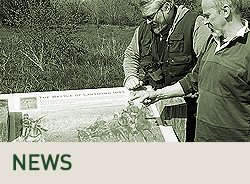The Cropredy Campaign 1644
1644
1643 had been the high point for the royalist cause, but they had been unable to capitalise upon this. Then 1644 opened with parliamentarian victories at Nantwich and, in March, at Cheriton. Despite some successes, Charles had lost the initiative in the field. Most importantly he dismissed Prince Rupert's argument that now they held Bristol, as the country's second city, it would make a far more secure royalist headquarters. As a result he found his capital of Oxford ever more vulnerable and an increasing liability.
In an attempt to draw the parliamentarian armies away from Oxford, Charles led a force west towards Worcester. Sir William Waller and the Earl of Essex combined their two armies and promptly gave chase. But Charles' strategy was successful; he eluded the pursuing forces, returning to Buckingham via Oxford.
It was then that Essex, parliament’s Lord General, made his most incompetent and disastrous decision of the war. Fuelled by intense personal rivalry with Waller, he divided their forces, which otherwise heavily outnumbered those of the Oxford army. As Essex marched off into the South West to the relief of Lyme Regis, Waller was left to play a game of cat and mouse through the Midlands with a royalist army which was now on much more even terms.
Though neither side could claim Cropredy as a major victory, the failure of Waller to defeat the King, was further exacerbated by his inability to locate the royalist forces in the days following the battle. As a result the royalist capital and stronghold of Oxford remained secure. Most importantly, Charles I's Oxford army was released to advance unhindered to the South West in pursuit if Essex's army.
Had Essex worked with Waller to exploit their major advantage of numbers, then he might well have destroyed the Oxford army. Together with the massive royalist defeat at Marston Moor, in early July, this might have hastened the end of the war. Instead Essex was ultimately responsible for first the defeat then disintegration of Waller's army, and then for throwing away his own army in the debacle at Lostwithiel.
Perhaps the greatest significance of the Cropredy campaign was the realisation, after the subsequent disintegration of Waller's army, with desertion of some 2,000 troops, that for Parliament to win the war it was essential that it completely reorganise its forces. As Waller reported shortly after the battle: ‘My Lords……… till you have an army merely your own that you may command it is in a manner impossible to do anything of importance’. Thus Waller's failure at Cropredy Bridge contributed directly to the formation of the New Model Army, but also removed any chance that Waller himself might be appointed its commander.







